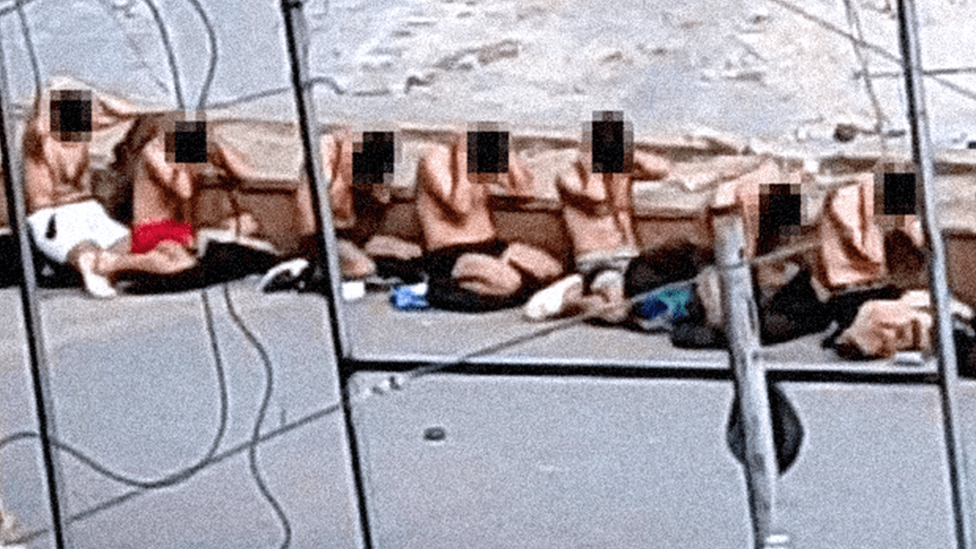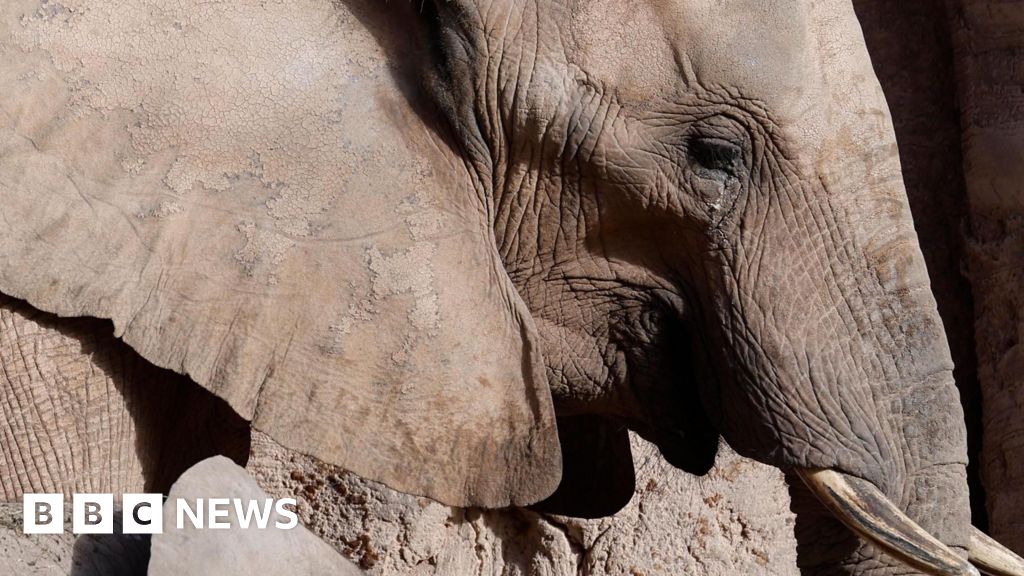ARTICLE AD BOX

By Alice Cuddy
BBC News, Jerusalem
Palestinian medical staff in Gaza have told the BBC they were blindfolded, detained, forced to strip and repeatedly beaten by Israeli troops after a raid at their hospital last month.
Ahmed Abu Sabha, a doctor at Nasser hospital, described being held for a week in detention, where, he said, muzzled dogs were set upon him and his hand was broken by an Israeli soldier.
His account closely matches those of two other medics who wanted to remain anonymous for fear of reprisals.
They told the BBC they were humiliated, beaten, doused with cold water, and forced to kneel in uncomfortable positions for hours. They said they were detained for days before being released.
The BBC supplied details of their allegations to the Israel Defense Forces (IDF). They did not respond directly to questions about these accounts, or deny specific claims of mistreatment. But they denied that medical staff were harmed during their operation.
They said that "any abuse of detainees is contrary to IDF orders and is therefore strictly prohibited".
WARNING: Some readers may find details in this article distressing.
The IDF raided the hospital in the southern Gazan city of Khan Younis - which was one of the few in the Strip still functioning - on 15 February, saying intelligence indicated that the hospital housed Hamas operatives.
They also said Israeli hostages taken by Hamas on 7 October had been held there - and some of the hostages themselves have publicly said they were kept at Nasser. Hamas has denied that its fighters operate inside medical facilities.
Footage secretly filmed in the hospital on 16 February, the day the medics were detained, was shared with the BBC.
It shows a row of men stripped to their underwear in front of the hospital's emergency building, kneeling with their hands behind their heads. Medical robes are lying in front of some of them.
Verified footage shows people detained by Israeli troops after Nasser Hospital raid
"Anybody who tried to move his head or make any movement got hit," the hospital's general manager, Dr Atef Al-Hout, told the BBC. "They left them for around two hours in this shameful position."
The IDF told the BBC: "As a rule, during the arrest process, it is often necessary for terror suspects to hand over their clothes such that their clothes can be searched and to ensure that they are not concealing explosive vests or other weaponry.
"Clothes are not immediately returned to the detainees, due to the suspicion they may conceal means that can be used for hostile purposes (such as knives). Detainees are given back their clothes when it's possible to do so."
Medical staff said that they were then taken into a hospital building, beaten, and then transported to a detention facility, all while undressed.
Dr Abu Sadha, the 26-year-old newly qualified doctor and volunteer medic at Nasser, described some elements of his treatment while in detention as torture, such as making detainees stand for hours without a break. He said other punishments given to detainees included being made to lay on their stomach for prolonged periods and delaying their meals.
Dr Abu Sabha said he was detained and beaten by Israeli forces after the raid on Nasser Hospital.
An expert in humanitarian law said the footage and the testimony from the medical staff interviewed by the BBC was "extremely concerning". He said some of the accounts provided to the BBC "very clearly cross over into the category of cruel and inhumane treatment".
Dr Lawrence Hill-Cawthorne, co-director of the Centre for International Law at the University of Bristol, said: "It goes against what has for a long time been a very fundamental idea in the law that applies in armed conflict, which is that hospitals and medical staff are protected.
"The fact that they treat nationals of the enemy side should not in any way undermine their protection," he said.
The BBC has been investigating the hospital's story for several weeks, speaking to doctors, nurses, pharmacists and displaced people camping in the courtyard. We have cross-checked details in these accounts.
We were given the names of 49 Nasser medical personnel to have been detained. Of those, 26 were named by multiple sources, including medics on the ground, the Hamas-run health ministry, international groups, and the families of those missing.
The three medics who say they were detained and later released have not given their accounts publicly before. They include Dr Abu Sabha, who we interviewed twice. His story remained consistent, and we corroborated key parts of his account independently.
Families of five other medics at the hospital have told the BBC their loved ones are missing. In addition, the International Committee of the Red Cross has confirmed to the BBC that it has received dozens of phone calls from people who say family members, including medics, who were at Nasser, are now missing.
Medics who remained at Nasser say the IDF's operation at the hospital left them unable to care for patients. When the IDF took control, nearly 200 patients were being treated there, many of them "bedridden", including six inside the ICU, according to Dr Hout, the general manager.
Those staff allowed to remain have described being ordered to move seriously ill patients between buildings, being taken away from their duties to be interrogated, and assigned patients whose cases they were not trained to deal with, all as they worked in cramped, unsanitary conditions.
Multiple medics said that 13 patients died in the days after Israel's takeover.
They said many of those patients had died because of the conditions at the hospital, including a lack of electricity, water, and other essentials needed to keep Nasser running. We cannot independently verify this. A doctor shared photos of bodies in bags on beds that we have confirmed were taken in a ward at the hospital.
The IDF told the BBC that it had "provided the hospital with hundreds of food rations and an alternative generator that enabled it to continue functioning and treat the patients within it".
The "essential systems" of the hospital kept functioning during the IDF's operation on an uninterruptible power supply system, it said.
On 18 February, the World Health Organization (WHO) said the hospital was short of food and basic medical supplies, and had ceased to function. The remaining patients were sent to other hospitals around Gaza and the medical staff who worked there left shortly afterwards.
Doctor: 'I thought I was going to be executed'
Released detainees and other medics told the BBC that the maternity building, called Mubarak, became the place where the IDF interrogated and beat staff. Dr Abu Sabha said he was initially picked to stay with patients after the raid, but was later taken to Mubarak, which he said had become "more like a torture place".
"They put me on a chair and it was like a gallows," he said. "I heard sounds of ropes, so I thought I was going to be executed.
"After that they broke a bottle and it [the glass] cut my leg and they left it to bleed. Then they started bringing doctor after doctor in and started putting them next to each other. I was hearing their names and their voices."
The IDF told the BBC it "does not and has not carried out mock executions of detainees, and rejects such claims".
All three of the detainees the BBC spoke to said they were crammed onto military vehicles and beaten as they were transported in a large group. Soldiers beat them with sticks, hoses, rifle butts and fists, they said.
"We were naked. Just wearing boxers. They piled us on top of each other. And they took us out of Gaza," one of the medics who wanted to remain anonymous said. "All along the way we were being hit and sworn at and humiliated. And they poured cold water on us".
Dr Abu Sabha said that during the journey, soldiers took the detainees out of the vehicle. "They took us to a patch of ground covered in gravel, forced us to kneel down and our eyes blind-folded… There was a pit in the ground, and we thought they would execute us and bury us here. We all started prayers."
He was then driven to a building where he and the other detainees with him would be held, he said.
The two other released detainees said that at some stage they were given medical checks but no medication. One said that instead of getting treatment for an injury, an IDF soldier hit him where he was injured.
Dr Abu Sabha told the BBC that detainees were routinely punished for perceived infractions. "At one point, the blindfold moved down a bit and my hands were handcuffed from behind and I could not fix it.
"They took me out for punishment… I was standing with my hands raised above my head and my face looking down for three hours. Then, he [a soldier] asked me to come to him. When I did, he kept hitting my hand until it was broken."
Later that day, he was taken to the toilet, beaten, and had muzzled dogs set on him, he said.
The day after, an Israeli doctor fitted him with a cast and then soldiers drew a Star of David on it, he said. This cast was later changed by a doctor in Gaza and Ahmed was wearing a cast during his interview with the BBC.
The BBC confirmed that Dr Abu Sabha had an X-ray and sought treatment for a broken hand at a field hospital in Gaza after his detention, and that he arrived there in a cast with a Star of David drawn on it.
The IDF did not address the BBC's questions about Dr Abu Sahba's cast.
None of the three medics were made aware of any specific charges, but two said interrogations focused on whether they had seen hostages or Hamas fighters within the hospital.
They said they were also asked about their whereabouts on 7 October, when Hamas gunmen rampaged from Gaza into Israel and killed about 1,200 people, taking 253 others hostage. More than 130 hostages are still believed to be held by Hamas. Israeli officials have said at least 30 of them are dead.
The Hamas-run health ministry in Gaza says more than 31,000 people have been killed in Israel's retaliatory air strikes and its ongoing ground offensive.
One of the released detainees said that two days after being interrogated, IDF officers told him there was no evidence and he would be released.
"I asked him, 'Who will compensate me for all the beatings and humiliation I've been through, that you did to me, while I knew that I wasn't involved in anything?' He started muttering, 'I don't have anything on you. No charges.'"
Dr Abu Sabha told the BBC he was never interrogated during his eight days of detention.
The three medics we spoke to say they were transported back to Gaza blindfolded after their release.
The BBC has confirmed Dr Abu Sabha's account that he crossed back into Gaza at the Israeli-controlled Kerem Shalom crossing, which is near the southernmost point of the Strip where Gaza, Israel and Egypt meet.
The medics' accounts are at odds with a separate briefing given to the BBC by a senior IDF official who said that no arrests were made of medical staff at Nasser, "unless we knew that it was possible to get this or that intelligence information" from them.
"We had reasonable grounds to assume that they have information, so we took them in for questioning and interrogation, but not beyond that," the official said.
"There were no handcuffs, we did not take them away for interrogation, nor for advanced arrest, but for the purpose of questioning and trying to obtain information about the hostages or the Hamas commanders who were in the hospital… a very simple questioning and that's it."
Some hostages taken from Israel on 7 October have described being brought into the Nasser hospital complex in an ambulance. One released hostage said her husband - who remains in Gaza - was covered in a sheet to look like a corpse.
They have described being kept in small rooms and being forced to knock if they needed to go to the toilet. One has described her time in captivity as "psychological warfare".
The International Committee of the Red Cross (ICRC) says that since 7 October, Israel has suspended its detention visits, meaning it has not been able to visit any detainees.
It told the BBC it was "deeply concerned" by the reports of arrests and ongoing detention of medics.
"Wherever and whoever they may be, detainees need to be treated humanely and with dignity at all times, in accordance of international humanitarian law," it said.
"The ICRC has continuously called for, and is ready to immediately resume, detention visits in order to monitor the treatment of detainees and the conditions of detention."
An internal UN report seen by the BBC has described widespread abuse of Palestinians who have been captured and interrogated at makeshift Israeli detention centres since the war began, which are similar to the accounts the medics gave. The IDF has previously denied specific allegations in the UN report, including the denial of access to water, medical care and bedding.
Back at Nasser 'hospital could barely function'
Meanwhile, in Nasser hospital, a few medics were allowed to stay and care for the remaining patients.
Some patients had been detained during the raid, according to Dr Hout, the general manager.
In one video provided to us by a Nasser eyewitness, IDF soldiers wheel two hospital beds and the occupants' hands are hoisted above their heads, zip-tied. We have verified it is authentic.
In separate footage published by the IDF, people can be seen lying on beds in the hospital grounds with their hands zip-tied, their arms in a similar raised position. We do not know who these people are, or what happened to them after this footage.
The IDF said: "We emphasize that the hands of patients who were not suspected of involvement in terrorism were not tied."
Medics who remained were frightened of being shot if they defied orders not to leave the building, Dr Hatim Rabaa, who also worked at Nasser, told the BBC in a phone call on 22 February, as explosions sounded in the background. But nevertheless they went down to the yard to collect water, worrying that patients would otherwise die, he said.
"People were dying of thirst. On my shoulders I carried three gallons of water so that I can make people drink. What else could I do?"
Multiple medics said that the IDF would not grant them permission to bury or even move the bodies of patients who died in the aftermath of the operation. The bodies remained inside with staff and patients as they began to decompose, the medics said.
"The smell filled the whole department," Dr Rabaa said. "Patients were screaming 'please remove them from here'. I was telling them 'it isn't in my hands'."
Dr Rabaa was one of a small group of medics chosen to remain with patients. He said that he too had been stripped to his underwear and made to kneel in front of the emergency department - but he was then led away to the building where patients were kept.
He said he does not know what happened to his colleagues he left behind in the courtyard.
The BBC put detailed questions about the allegations to the Israeli military.
In its response, the IDF told the BBC that "about 200 terrorists and suspects of terrorist activity were detained, including some who posed as medical teams". They said that "many weapons were found, as well as closed medicines intended for Israeli hostages".
They said they had operated in a "precise and focused manner, creating minimal damage to the hospital's ongoing activity, and without harming the patients or the medical staff".
Additional reporting by Muath Khatib and by BBC Arabic's Marie-Jose Al Azzi and Soha Ibrahim
Verification by Richard Irvine-Brown, Benedict Garman and Emma Pengelly, BBC Verify
Visual journalism and design by Gerry Fletcher, Lilly Huynh and Zoe Bartholomew

 10 months ago
1492
10 months ago
1492








 English (US) ·
English (US) ·